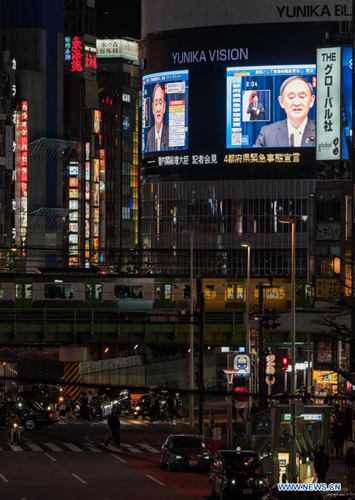
Japan's Prime Minister Yoshihide Suga is shown on outdoor screens during a press conference as he declares a state of emergency over COVID-19 in Tokyo, Japan on April 23, 2021. Yoshihide Suga on Friday declared a third state of emergency over COVID-19 in Tokyo, Osaka, Kyoto and Hyogo. The state of emergency will come into effect from Sunday to May 11.Photo:Xinhua
Japan's Prime Minister Yoshihide Suga on Friday declared a state of emergency over COVID-19 in Tokyo, Osaka, Kyoto and Hyogo.
The state of emergency, a third one the country has declared, will come into effect from Sunday to May 11.
The state of emergency is aimed at curbing a surge in COVID-19 cases during the upcoming Golden Week holidays.
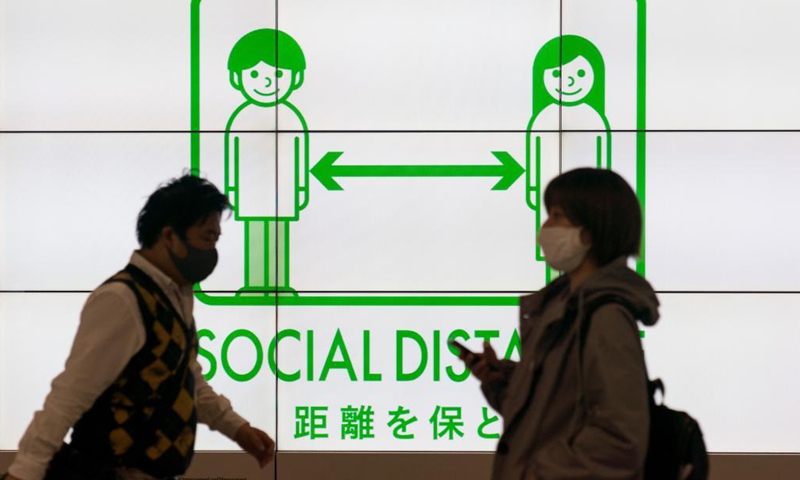
People walk past a social distancing signage in Tokyo, Japan on April 23, 2021. Japan's Prime Minister Yoshihide Suga on Friday declared a third state of emergency over COVID-19 in Tokyo, Osaka, Kyoto and Hyogo. The state of emergency will come into effect from Sunday to May 11.Photo:Xinhua
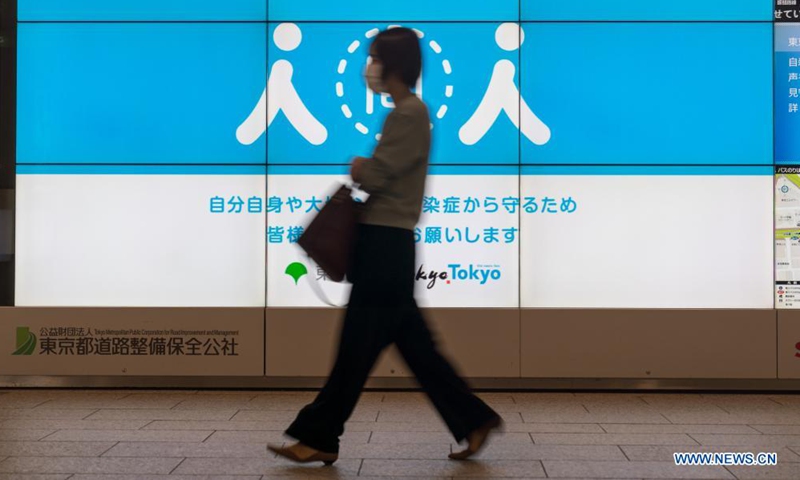
A woman walks past a social distancing signage in Tokyo, Japan on April 23, 2021. Japan's Prime Minister Yoshihide Suga on Friday declared a third state of emergency over COVID-19 in Tokyo, Osaka, Kyoto and Hyogo. The state of emergency will come into effect from Sunday to May 11.Photo:Xinhua
"We will implement short and intensive measures during Golden Week, strengthening steps related to eating establishments and temporarily halting the flow of people," Suga said when announcing the decision at a COVID-19 task force meeting.
"We must take strong measures in a focused manner while many people are on break during Golden Week to bring the virus under control," Suga said.
Stricter restrictions such as asking restaurants and bars not to serve alcohol and shutting down major commercial facilities will be in place.
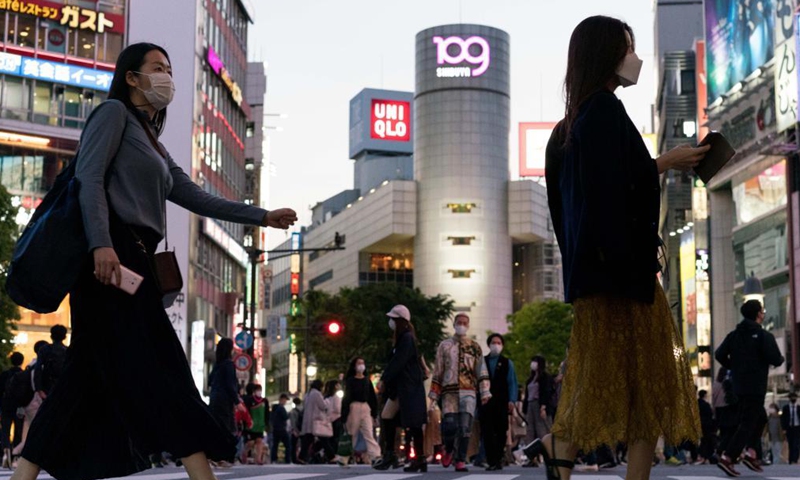
Pedestrians wearing protective face masks walk across a busy intersection at Shibuya in Tokyo, Japan on April 23, 2021. Japan's Prime Minister Yoshihide Suga on Friday declared a third state of emergency over COVID-19 in Tokyo, Osaka, Kyoto and Hyogo. The state of emergency will come into effect from Sunday to May 11.Photo:Xinhua
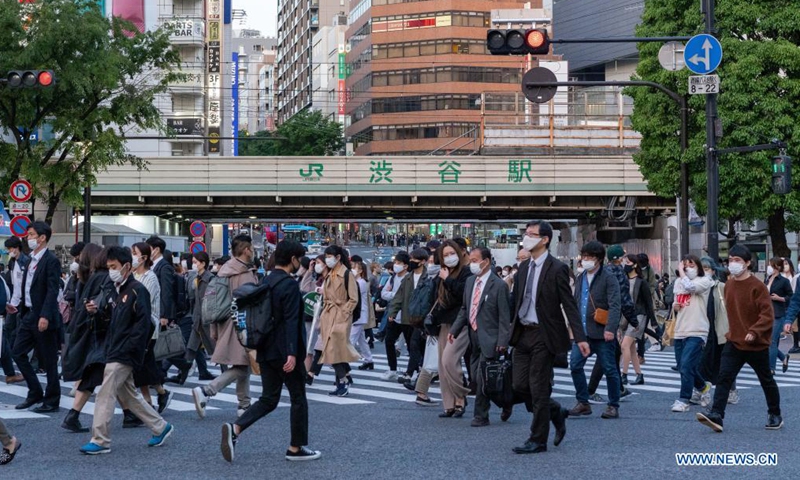
Pedestrians wearing protective face masks walk across a busy intersection at Shibuya in Tokyo, Japan on April 23, 2021. Japan's Prime Minister Yoshihide Suga on Friday declared a third state of emergency over COVID-19 in Tokyo, Osaka, Kyoto and Hyogo. The state of emergency will come into effect from Sunday to May 11.Photo:Xinhua
Meanwhile, the eating establishments will be asked to close by 8 p.m., while the ones serving alcohol or providing karaoke services will be asked to close entirely.
Although the state of emergency will not entail a complete lockdown like some other countries have imposed, spectators will be banned from large events, while train and bus operators will be asked to end services earlier on weeknights, with reduced operation of transportation on weekends and holidays.
Major commercial facilities such as department stores and shopping malls will also be asked to stop operation, only leaving sections selling daily necessities open.
Tokyo Governor Yuriko Koike said she will ask businesses to turn off their lights after 8 p.m. so that people would be discouraged from going out late at night.
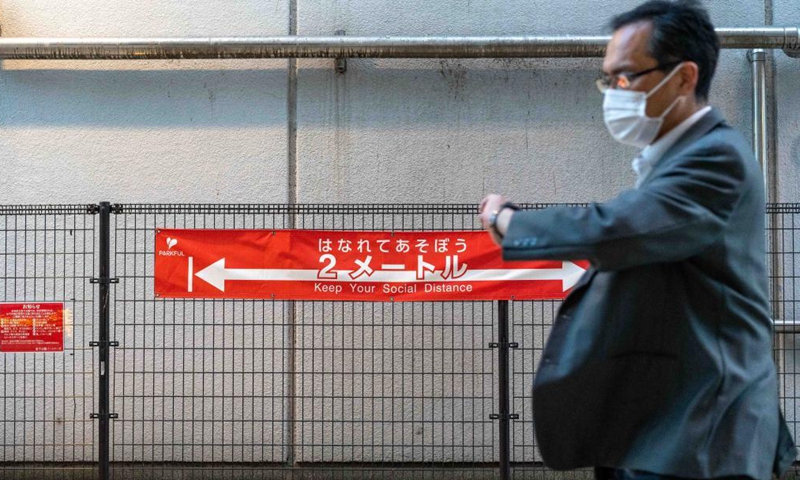
A man walks past a social distancing banner in Tokyo, Japan on April 23, 2021. Japan's Prime Minister Yoshihide Suga on Friday declared a third state of emergency over COVID-19 in Tokyo, Osaka, Kyoto and Hyogo. The state of emergency will come into effect from Sunday to May 11.Photo:Xinhua
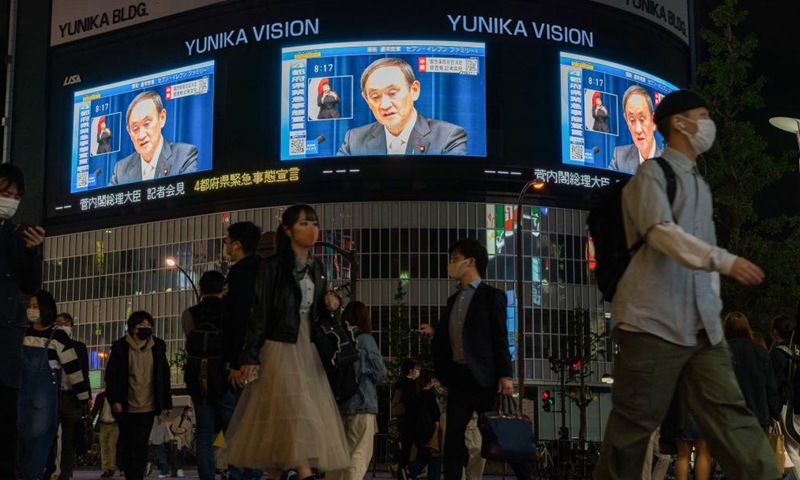
Japan's Prime Minister Yoshihide Suga is shown on outdoor screens during a press conference as he declares a state of emergency over COVID-19 in Tokyo, Japan on April 23, 2021. Yoshihide Suga on Friday declared a third state of emergency over COVID-19 in Tokyo, Osaka, Kyoto and Hyogo. The state of emergency will come into effect from Sunday to May 11. Photo:Xinhua
The state of emergency may be extended if the situation does not improve sufficiently, said Shigeru Omi, an infectious disease expert who chairs a government subcommittee on the COVID-19 response.
Yasutoshi Nishimura, the minister in charge of the government's COVID-19 response, asked people to stay at home and avoid nonessential outings during the state of emergency.
According to health experts, people should be on alert of the spread of highly contagious COVID-19 variants, primarily a type first detected in Britain.
A Ministry of Health, Labor and Welfare panel has estimated that variant viruses constituted around 80 percent of all cases in Osaka and Hyogo and are rapidly growing in Tokyo.
